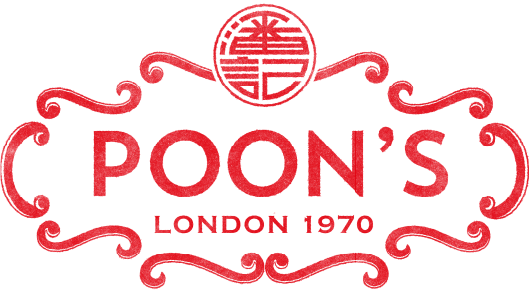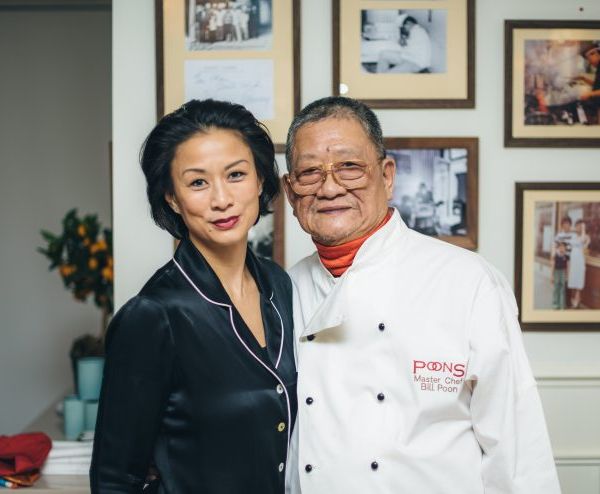


The Chef’s Table.
Amy Poon, Co-Owner of Poons, joins us for the latest instalment of The Chef’s Table.
Established by seventh generation chef Bill Poon, Poon’s dominated the London Chinese dining scene from 1973 to 2003, gaining a cult following and a Michelin star in 1980. In 2018, Bill’s daughter, Amy, brought Poon’s back in a new guise with a critically acclaimed pop-up in Clerkenwell, followed by a Poon’s Wontoneria pop-up at Stevie Parle’s JOY at Portobello.
Born and raised in London and Geneva, Amy Poon is a passionate gourmand. Here, she shares her favourite eateries, go-to dishes, and advice for other restaurateur/chefs also in ‘start-up mode’.
How did you first get into cooking?
I don’t remember ever not cooking. My parents opened their first Poon’s restaurant the same year that I was born. We used to live in the flat above the restaurant at 27 Lisle Street so I was immersed from birth in a very strong food culture.
What are some of your childhood food memories?
On one occasion, when I came home from prep school, my father and I decided to stop at an Italian restaurant in Belsize Park that we had driven past dozens of times but never thought to try. I was about nine years old. For pudding, I wanted zabaglione but the chef had left already – it was late in the afternoon and this was the 80s when restaurants closed between lunch and dinner service. My father spied a gueridon. He asked the maître d’ if he had eggs, sugar, and Marsala, to which the answer was an indignant, “but of course!” My father asked him to bring them along with the gueridon. He stood up, rolled up his sleeves, and made me zabaglione, to the amazement of the restaurant staff who all stood around the table, exclaiming in disbelief that a Chinese man could whip up that most classic of Italian desserts.
Whenever I came home (by which I mean, to the restaurant) from school, my father would inevitably be dining with a large group of strangers who had recently arrived from China – poets, artists, and writers. I was always asked to join them and felt the warmth and gratitude, the goodwill and appreciation, that flowed with the wine, of these strangers who had found a little piece of home and comfort in a strange and foreign land.
Who, what, or where most influenced your cooking?
My mother, after all she has to satisfy my father’s discerning taste buds! From a young age, I was her sous, her commis, and her KP. She has an extraordinary palate that rivals my father’s in that she can often tell you what a chicken was fed and how a fish was caught when she eats them.
The food that makes you happiest and why?
Rice in its many forms – simply steamed, rice flour for sticky tang yuan (rice dumplings), and rice noodles, congee, fried rice… Nothing comforts or grounds me like a bowl of hot, freshly steamed rice in my belly.

Favourite cooking gadget?
Wooden chopsticks. Of all the clever gadgets that have been invented for the kitchen, I love the simplicity and versatility of a pair of wooden chopsticks. I use them for mixing, for stir-frying, for prodding things to see if they’re cooked, as a trivet, to keep lids ajar, as a rest inside a steamer to stack dishes on, and of course to eat with.
Favourite cookbook(s)?
Every Grain of Rice by Fuchsia Dunlop – sometimes when I don’t know how to explain something about Chinese cooking, she provides the perfect reference. It’s a book I wish I could have written.
Not strictly a cookbook but Blue Trout and Black Truffles by Joseph Wechsberg – a gloriously witty and nostalgic celebration of the culinary wonders of another era with a few impossible-to-use recipes.
What’s the one ingredient you can’t live without?
There is a Chinese saying that soya sauce, Shaoxing wine, sugar, salt, sesame oil, and vinegar are the absolute essentials for Chinese cooking. If I had to choose one, it would probably be soya sauce.
Where are the best places to shop for produce in London?
I love venturing to Billingsgate for seafood at 4AM. HG Walter is our meat supplier, but I love a market and often go to the London Farmers Market in Notting Hill. For Chinese ingredients, I go to See Woo in China Town and Wing Yip.
How does travel influence your cooking?
I’ve realised that most of my holidays are planned around where and what to eat, so travel and food are very much entwined. I’m fascinated by the similarities in cuisines around the world. I’ve always been daunted by bread but after a trip to Mongolia where our guide made scallion flat breads, like Chinese Cong You Bing, on an open campfire in the middle of nowhere on the Mongolian Steppe with just a frying pan, I’ve come to embrace simplicity in my cooking.
Where are your favourite places to dine in London?
The mothership! Dinner at my parents’ is always a culinary highlight. Royal China and Royal China Club are both dim sum rituals and I often go to Four Seasons on Gerrard Street for roast duck and rice. Sally Clarke is always a treat and Sessions Arts Club is a current favourite.
What do you always avoid ordering on a menu?
Chicken – and I try very hard to not order pudding because my jeans don’t like…
By contrast, must-order items on a menu include…
Fries! I can’t resist potatoes. Often anything that involves bone marrow, raw beef, anchovies, shellfish, and aubergines.
Why do you think it’s important to gather round the table to eat?
When you eat together, it forms connections. It’s all about love. Preparing a meal is an act of love, sharing it, and appreciating it is a reciprocal gesture. I find there is a lot of gratitude around a dinner table, kindness, intimacy. It’s hard to be cross when you’re eating with people.
What is your go-to meal at home when you’re low on time?
Claypot rice with Poon’s wind-dried meats but done in a rice cooker with some stir-fried veg. I always have wind-dried sausages and bacon in my cupboard. I pop a piece of each on top of the rice as it cooks and dinner is ready in 15 minutes.
Do you find cooking therapeutic?
When I have time, I find cooking incredibly calming. I like to go about the kitchen, from one task to another gently and with an open mind. I often find cooking one thing leads me create another. It brings me a satisfying sense of completion.
Advice for women thinking about starting up a business in the food or restaurant industry?
I’m not sure I’m qualified to give advice. I am still very much in learning/start-up mode and I’m not sure the advice I’d give to women would differ from that I would give to anyone else. Keep an open mind, be flexible, don’t be a dick, learn the details, hone your skills, talk to everyone, adapt. Don’t rush and keep things in perspective. Eating well and working with food as many of us do is a joy and a privilege – it’s good to remember that.
Newsletter
Subscribe for occasional updates and to get 18% off your first online shop at Poon’s London.
